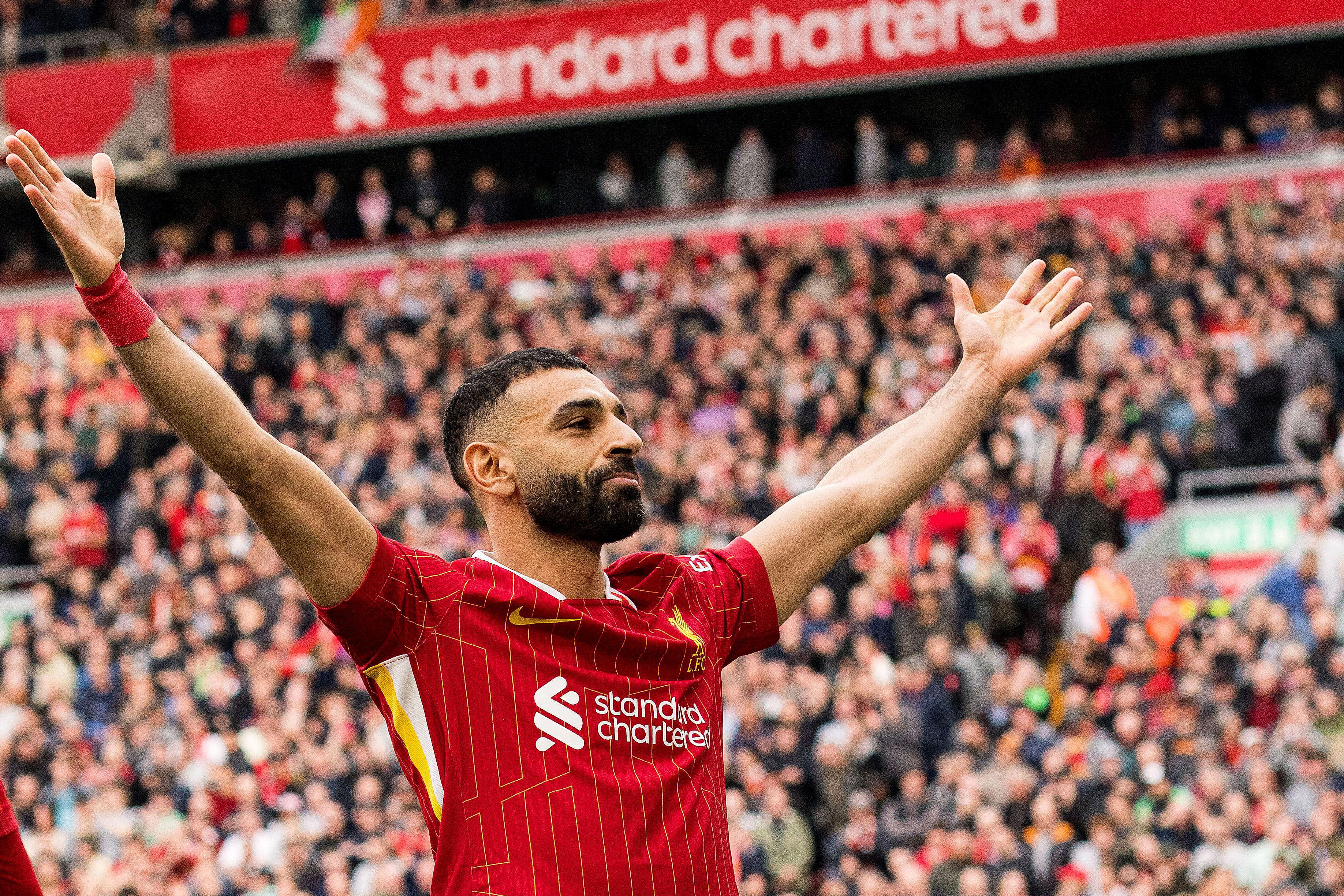Flares, fighting and fear: Why Olympiakos vs Panathinaikos is Europe's maddest derby
Pete Hall on Greece's most hate-filled fixture, where violence, manager-bashing missiles and mayhem come as standard...
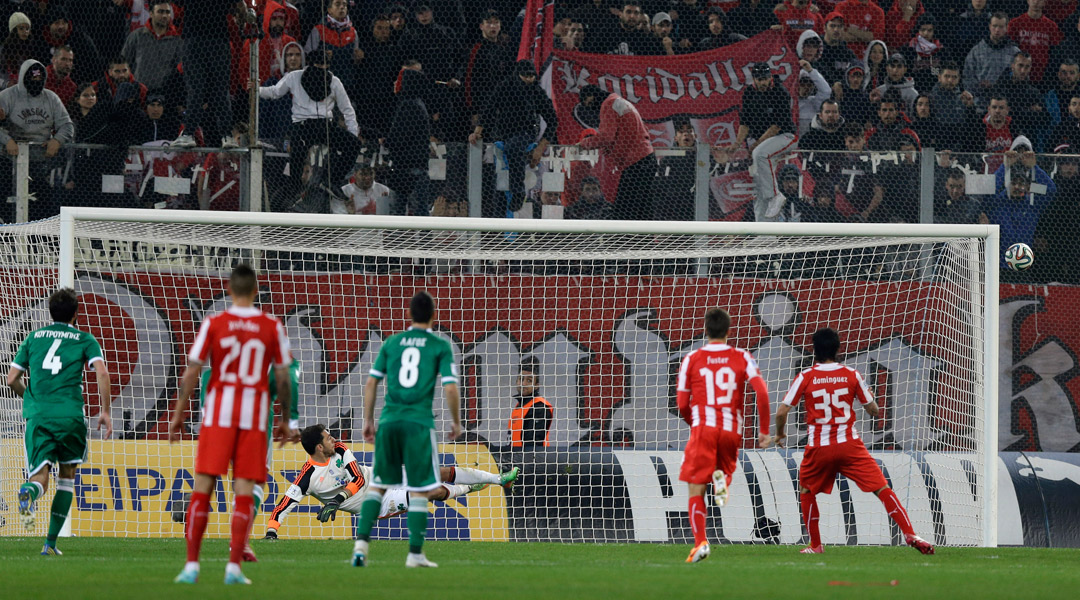
“They don’t bother us, they are history,” proclaimed a group of buoyant Olympiakos fans after one of their finest hours – a comfortable win over a hapless Manchester United in last week’s Champions League last 16 first leg.
Yet, they weren’t talking about the beleaguered Premier League champions they had so easily brushed aside, rather their fierce Athens rivals Panathinaikos, who were up next the following Sunday.
But this blasé attitude towards the ‘Derby of Eternal Enemies’ was anything but a prelude to the game itself.
After FFT had witnessed the intimidation firsthand, nothing bothered the Erythrolefkoi's (red-whites) vociferous support more than being humiliated by those they despise the most.
Get FourFourTwo Newsletter
The best features, fun and footballing quizzes, straight to your inbox every week.
Goals from Danijel Pranjic, Marcus Berg and on-loan Newcastle man Mehdi Abeid brought the home side’s 27-match unbeaten run to an abrupt halt, as Panathinaikos ensured they would remain the only unbeaten side in a Greek league season with victory at a canter.
But they were left running for their lives as a result.
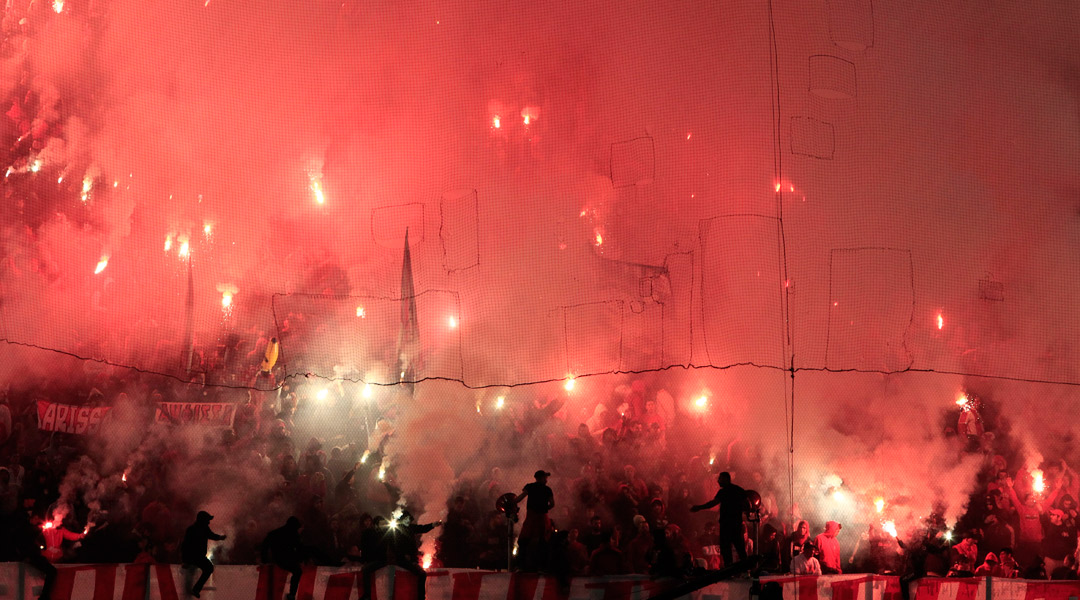
After our chance meeting with the fervent young group of Olympiakos fans who were keen to bask in the glory of beating illustrious opposition like United, they invited us to make our second journey to the Karaiskakis stadium, and wouldn’t accept no for an answer.
As one of the fiercest rivalries in world football, the anticipation was palpable throughout the city on the day of the game.
The buzzing tourist haven of Monastiraki was awash with groups of young men dressed in black and doing their best to conceal identities. But rather than drinking and singing like the United fans did just a few days previously, heated conversations spilled out onto the street. “They are making plans,” Kyros, one of our match-going companions, told us.
So after making ourselves look less like a tourist, dropping our camera back at the hotel, we made the short journey to the port of Piraeus – the third largest municipality in Greece.
Police fighting a losing battle
Piraeus, part of Athens agglomeration, sits on the Saronic Gulf and is the busiest passenger port in Europe. An integral part of ancient Greek history and the prosperity of Attica, Piraeus saw many immigrants settle there, leading to a diverse population.
“They are the rich who are the problem with our society,” Kyros explained, getting visibly more agitated as we approach the recently revamped stadium.
Hooliganism in England has been very much on the decline, but that's not so much the case here. Although away supporters are banned at derby matches, the violence still goes on and police are often the targets of fan aggression.
Olympiakos fans and the authorities have always had a fractious relationship. Predominantly of lower-class backgrounds, they have a contempt for the rich austerity of their rivals Panathinaikos, and feel more connected to the roots of their club as a result.
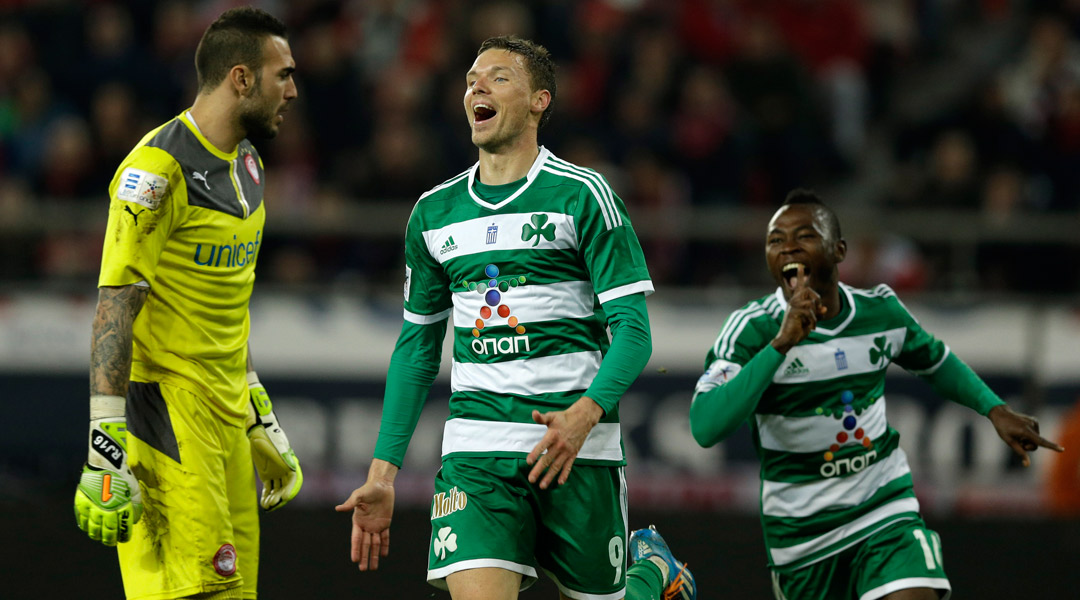
“Your power is your fiery fans, who never let you down,” as the Olympiakos anthem goes. They've stuck to that philosophy ever since.
But the perception of Panthinaikos couldn’t be more ironic in the current climate. Greece itself has been through financial peril in recent years, but Oi Prasinoi (the Greens) have been hit even harder, with the fan-owned club struggling to balance the books.
Their crumbling Apostolos Nikolaidis is home once more, after the building of a new ground was halted due to financial problems. Meanwhile, their young and inexperienced squad has slipped down the league as a result, and didn’t qualify for European competition for the first time in 16 years last season.
“We are too good to be troubled by the rich b*****ds,” Kyros confidently declared upon entrance to the ground.
Missiles, and feared catastrophe
Keeping our mouth firmly shut, and making the odd gesture that Kyros and his friends insisted we joined in on, FFT soaked up the hostile atmosphere that United supporters were completely oblivious to as their team suffered at the hands of the Greek champions.
With no away fans to direct their chants at here, though, the terrace masses joined together in directing their hatred onto the rival players in green instead.
The opening exchanges were frustrating to watch; the referee had to pause play to remove objects thrown onto the pitch, and flares were set off out around the stadium. Leaders of the various sets of ultras sat on the fence, orchestrating their choir and rarely turning to watch the match itself.
The football was ostensibly poor from both sides, but the Greens simply packed the midfield and hit the unsuspecting champions on the counter-attack – a tactic United boss David Moyes may have had more success deploying.
At 0-0, the game was put into perspective as Olympiakos striker Michael Olaitan collapsed on the field and was taken away on a stretcher. The ground fell silent, not knowing what had happened to their man. The moment seemed to affect the players, who looked visibly shaken, but the crowd soon resumed their energetic chanting.
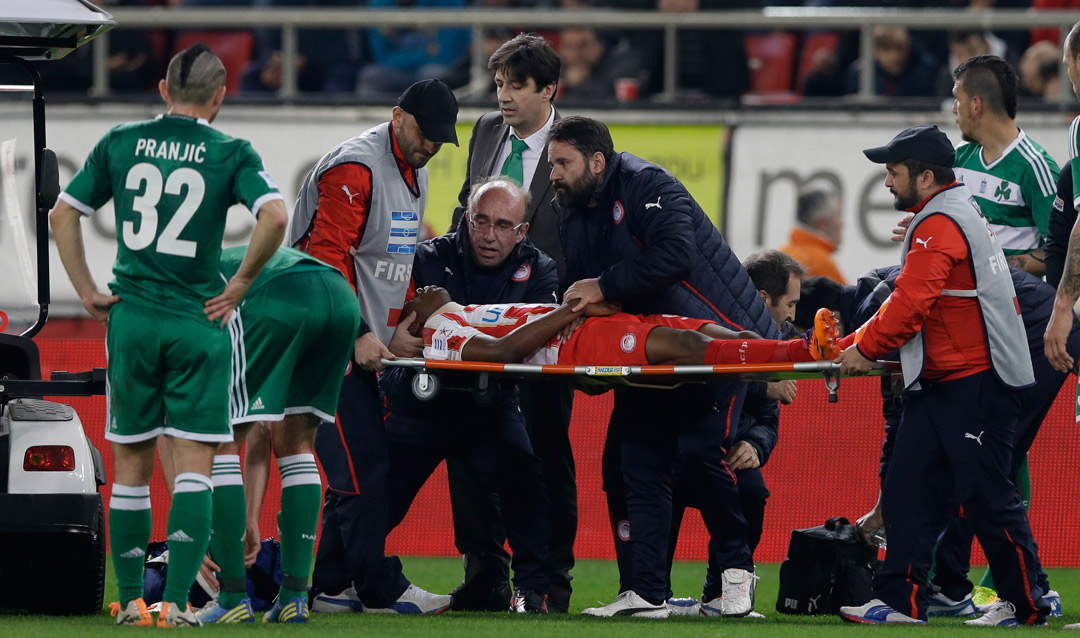
After taking the lead just before the break, the Greens increased their lead through Berg after half-time – but the home side had the opportunity to halve the deficit from the penalty spot soon after.
While protesting about the decision, Panathinaikos boss Yiannis Anastasiou seemed to have been hit with something, as he lay on the floor clutching his face. The wailing fans around us erupted, insisting the rival coach was making a meal of it. The game was delayed yet further. It turned out that Anastasiou was hit by a plastic cup square in the face.
Frustration reached boiling point when Alejandro Dominguez, who United made look like a world-beater, blazed the resulting penalty over the bar, and to make matters worse the visitors grabbed a third in the last minute.
Objects rained down onto the pitch as the referee brought the game to a premature end; well within his rights, under the circumstances. Panathinaikos players sprinted to the tunnel for safety, and the coaching staff hurried for cover from the tirade of objects hurtling towards them.
Not the first time - or the last
Anywhere else in the world, this game could well have been ended even sooner.
It's somewhat surprising that football’s governing bodies haven't stepped in to intervene, as all of this comes just two years after the clash was abandoned because of Panathinaikos fans setting fire to the scoreboard and stadium seats (in their own stadium, naturally).
A five-point deduction and the penalty of having to play four matches behind closed doors – the stiffest punishment in Greek Super League history – hasn’t altered things.
What's more incredible is how little the match actually meant to either side's league fortunes. With 19 points separating Olympiakos and their nearest challenger with just seven rounds to go, the Red-Whites are well on their way to a 16th title in 18 seasons since 1996/97. Yet the ill feeling was vociferous.
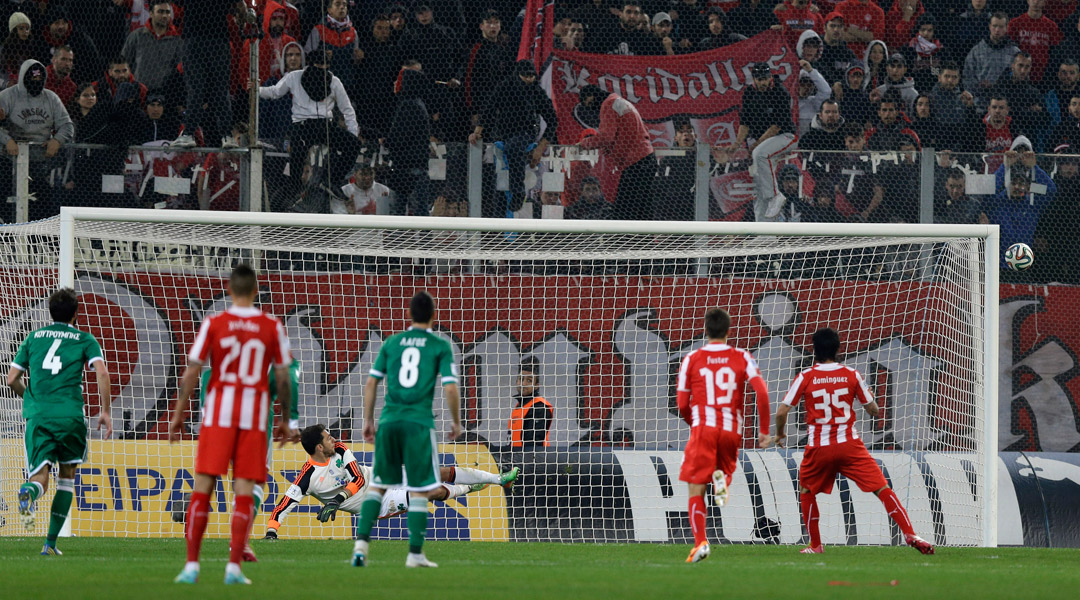
FFT insisted on making our exit – the violence was escalating outside the ground, and it was difficult to understand who or what they were fighting. “Without us, Athens would be nothing,” Kyros answered, not understanding the question. “We brought everything in from the sea, they built walls around us, yet they take the riches.”
Citing Piraeus’s strategic importance as a trade link throughout history is not something you might commonly associate with football fan disputes. But thanks to Greece's economical problems, class rivalry has once again reared its ugly head.
Manchester United fans weren’t privy to such an atmosphere, as there is no animosity to foreign visitors, a fact Panathinaikos boss Anastasiou eluded to after the match. “I saw Tuesday's game and marvelled at the fantastic atmosphere,” he said. “Now, we have reverted back to our usual culture, where we (away teams) aren't sure if we will leave the field in one piece. What can I say?”
Football rivalries rarely gets this intense these days, but until the situation in the Hellenic Republic improves, results will continue to mean the least when the two Athens rivals collide.
